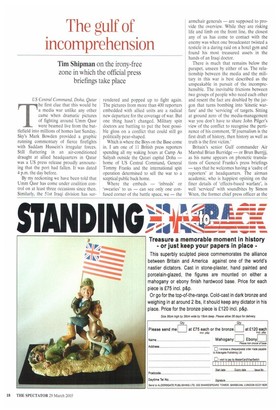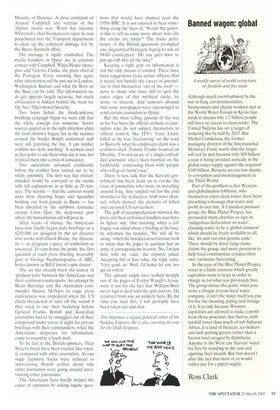The gulf of incomprehension
Tim Shipman on the irony-free zone in which the official press briefings take place
USCentral Command, Doha, Qatar
The first clue that this would be a media war unlike any other came when dramatic pictures of fighting around Umm Qasr were beamed live from the battlefield into millions of homes last Sunday. Sky's Mark Bowden provided a graphic running commentary of fierce firefights with Saddam Hussein's irregular forces. Still fluttering in an air-conditioned draught at allied headquarters in Qatar was a US press release proudly announcing that the port had fallen. It was dated 4 p.m. the day before.
By my reckoning we have been told that UMM Qasr has come under coalition control on at least three occasions since then. Similarly, the 51st Iraqi division has sur
rendered and popped up to fight again. The pictures from more than 400 reporters embedded with allied units are a radical new departure for the coverage of war. But one thing hasn't changed. Military spin doctors are battling to put the best possible gloss on a conflict that could still go politically pear-shaped.
Which is where the Boys on the Base come in. I am one of 11 British press reporters spending all my waking hours at Camp As Saliyah outside the Qatari capital Doha — home of US Central Command, General Tommy Franks and the international spin operation determined to sell the war to a sceptical public back home.
Where the embeds — 'inbreds' or `sweaties' to us — can see only one confused corner of the battle space, we — the armchair generals — are supposed to provide the overview. While they are risking life and limb on the front line, the closest any of us has come to contact with the enemy was when one broadcaster twisted a testicle in a daring raid on a hotel gym and found his most treasured assets in the hands of an Iraqi doctor.
There is much that remains below the parapet, unseen by either of us. The relationship between the media and the military in this war is best described as the unspeakable in pursuit of the incomprehensible. The inevitable frictions between two groups of people who need each other and resent the fact are doubled by the jargon that turns bombing into 'kinetic warfare' and the 'servicing' of targets. Sitting at ground zero of the media-management war you don't have to share John Pilger's view of the conflict to recognise the pertinence of his comment, 'If journalism is the first draft of history, then history as well as truth is the first victim.'
Britain's senior Gulf commander Air Marshal Brian Burridge — or Brun Burrjjj, as his name appears on phonetic translations of General Franks's press briefings — says that he welcomes having a `cadre of reporters' at headquarters. The airman academic, who is happiest opining on the finer details of 'effects-based warfare', is well 'serviced' with soundbites by Simon Wren, the former chief press officer at the Ministry of Defence. A close confidant of Alastair Campbell and veteran of the Afghan media war, Wren has become Whitehall's chief fireman ever since he was parachuted into the Transport department to clear up the collateral damage left by the Byers–Sixsmith affair.
The message is rigidly controlled. The media handlers in Qatar are in constant contact with Campbell, White House strategists and Victoria Clarke, the press chief at the Pentagon. Every morning they agree what information will he put out in London, Washington, Kuwait, and what the Boys on the Base can be told. The information we do get appears largely accurate, but much obfuscation is hidden behind the need for Op. Sec.: Operational Security, Two hours before the shock-and-awe bombing campaign began we were told that the whole concept was nonsense. Senior sources guided us in the right direction when the land offensive began, but as the marines crossed the border British uniformed staff were still parroting the line, 'I can neither confirm nor deny anything.' It seemed cruel at that point to ask them what day it was, lest it forced them into a crisis of conscience.
Two aspirations advanced confidently before the conflict have turned out to be wildly optimistic. The first was that military mistakes would be conveyed to the media with full explanations in as little as 20 minutes. The second — that the cameras would soon show cheering Iraqis and squaddies handing out food parcels in Basra — has been thwarted by the stubborn resistance around Umm Qasr, the deep-water port where the humanitarian aid will pour in.
After weeks of silence, the Americans have now finally begun daily briefings on a $250,000 set designed by the art director who works with David Blaine, the illusionist — as pregnant a piece of symbolism as you need. To ram home the point, the first question at each press briefing invariably goes to George Stephanopoulos of ABC, better known as Bill Clinton's spin doctor.
The set has already been the source of 'podium wars' between the Americans and their coalition counterparts. An attempt by Brian Burridge and the Australian commander Maurie McNarn to stage press conferences was torpedoed when the US chiefs threatened to turn off the sound if they tried to use their backdrop before General Franks. British and Australian journalists had to be smuggled out of their compound under cover of night for private briefings with their commanders, while the Americans, desperate for information, came to resemble a lynch mob.
To be fair to the British spinners, Fleet Street's finest have been treated like royalty compared with other journalists. At one stage Japanese hacks were reduced to interviewing British scribes about why other journalists were going around interviewing other journalists.
The Americans have hardly helped the cause of openness by asking supine ques
tions that would have shamed even the 1950s BBC. It is not unusual to hear something along the lines of, 'Would the general like to tell us some more about how vile the enemy are today?' The tricky pertinence of the British questions prompted one disgruntled Pentagon bigwig to ask an MoD counterpart, 'Do you guys have to put up with this all the time?'
Keeping a tight grip on information is not the only means of control. There have been suggestions from senior officers that it would not benefit the career of journalists to find themselves 'out of the loop' — news to many who have still to spot the outer edges of this mythical circle, let alone its innards. And rumours abound that some newspapers were encouraged to send certain journalists to Qatar.
But the most telling episode of the war so far has been the official attitude to journalists who do not subject themselves to official control, like ITN's Terry Lloyd, killed as he was 'freelancing' on the road to Basra by what his employers claim was a coalition shell. Tommy Franks boasted on Monday, 'I'm not aware of a single embedded journalist who's been harmed on the battlefield,' contrasting them with 'people who will go in harm's way'.
There is now talk that the Kuwaiti government has been leant on to revoke the visas of journalists who insist on travelling around Iraq. Also singled out for the cold shoulder is the al-Jazeera Arab news channel, which showed the pictures of killed and captured US servicemen.
The gulf of incomprehension between the press and their uniformed handlers does have its lighter side. One morning, when a colleague was called about a briefing at the base, he informed the handler, We will all be along,' which the bewildered serviceman took to mean that the paper in question had an army of correspondents in town. 'No, I'm just here with my valet,' the reporter joked. Accepting this at face value, the reply came, 'Very good, sir, Well, I'd better let you two get on with it.'
The episode might have walked straight out of the pages of Evelyn Waugh's Scoop, were it not for the fact that William Boot never had to deal with the spin doctors. He returned from war an unlikely hero. By the time you read this, I will probably have been taken out and shot.
Tim Shipman is deputy political editor of the Sunday Express. He is also covering the war for the Daily Express.









































































 Previous page
Previous page